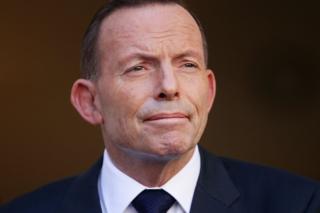 Image copyright
Image copyright
Getty Images
Contemplating a new life: Mr Abbott has remained tight-lipped about his next move
Former prime minister Tony Abbott has made his first appearance in Australia's parliament as a backbencher since his much-publicised ousting last month by Malcolm Turnbull. What happens when you go from being the most powerful man in the country to an ordinary MP in just a few weeks?
Mr Abbott's demotion from top gun to foot soldier in the Liberal Party is particularly notable given his past "meteoric rise" in politics, says political analyst Norman Abjorensen.
"This is a man who has had no setbacks in his political life or personal life, and now at 57 has faced a big defeat. It's an enormously difficult threshold to cross, and he's in totally new territory here as a politician and as a human being," says Dr Abjorensen, who is with the Australian National University.
Mr Abbott had spent much of his political career and the last two decades on the front bench, entering the cabinet in 1998 - four years after he entered politics - while John Howard was PM.
Putting it in perspective: the youngest sitting MP in parliament now - 25-year-old Wyatt Roy - was only eight years old when Mr Abbott was last on the backbench.
Mr Abbott has so far kept tight-lipped about his next move, though he has made clear he will not resign from the party. "I'm too young to retire, I've still got something to contribute in public life," he said in a recent radio interview.
Image copyright
EPA
Stephen Bell, managing director of human resource consultancy IHR Australia, says: "He's in a decision-making phase right now - anyone who gets demoted, whether it's in sport or in business, would go through this process."
"There could be feelings of self-doubt, perhaps even feelings of fear about the future and what it might bring."
University of Sydney politics lecturer Peter John Chen says: "We probably won't see anything till after the general election next year. Abbott's biding his time, and wants to see whether Turnbull can live up to the performance criteria he has set."
When Mr Abbott does make a decision, it may very well be to stage a comeback - he would not be the first former PM to do so, with Kevin Rudd of Labor pulling that off successfully when he toppled the woman who ousted him, Julia Gillard.
Image copyright
Getty Images
The Labor party under Mr Rudd (left) eventually lost to the Liberal-National coalition in the 2013 election
Mr Abbott has defended his record in interviews and has also insisted the Liberal Party could have won the next election if he remained as leader.
But Australian observers have mixed views on whether Mr Abbott could succeed.
One difference is that while Mr Rudd could leverage on his public popularity to convince his party colleagues to let him become leader again, Mr Abbott has been significantly unpopular, points out Dr Sally Young, associate professor of politics with the University of Melbourne.
In the meantime, Mr Turnbull has to galvanise the party while also figuring out how to handle - or placate - Mr Abbott.
Image copyright
AFP
Mr Turnbull has a hard task ahead as well
After a big change, "people in the organisation feel uncomfortable, the affected individual feels uncomfortable, so this becomes a real question of leadership - [Mr Turnbull] has to set an agenda and get the party to that" says Mr Bell.
"If people become disengaged, then we will see power vacuums - and opportunities for other people to take over the leadership."